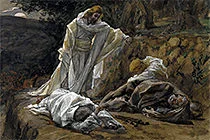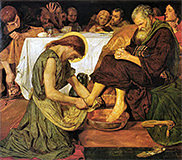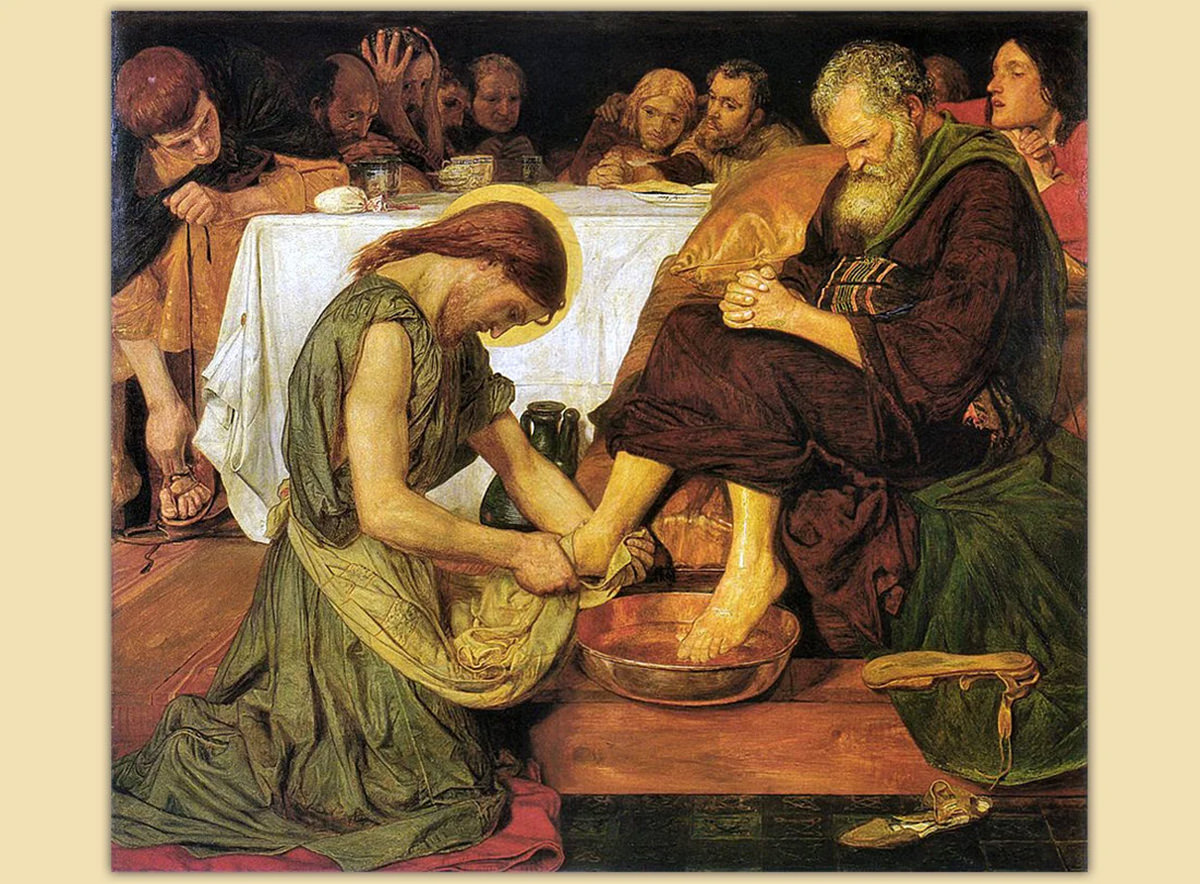
by Warren Camp
1 Peter 5:1–14 . . .
“Peter’s Humble Appeal to the Elders of the Flock”
Peter reminded us in his previous passage (open Warren’s commentary on 4:12–19) that Christ had suffered for each of us so that we’d finally and fully be finished with sin. He’s been talking about how difficult it is to be a Christian. When you suffer for being one, it’s essential that you entrust your soul to God and keep doing what’s right.
Pastor/teacher Bob Deffinbaugh writes this about Peter: “Of all the Lord’s disciples, who would have thought he’d pen the words of our text to the leaders of the churches? He argued with and even rebuked the Lord when He spoke of His coming suffering and death (Matthew 16:22). And, he argued with the other disciples about who was the greatest then and who’d be greatest in the coming kingdom (Mark 9:33–34; Luke 9:46; 22:24). Peter, like all of his fellow-disciples, was unwilling to take his place as a foot-washing servant at their Passover celebration (see photo). Neither was he immediately willing for His Lord to do so (John 13:6–9).”[1]
Apostle Peter became a changed man. His view of leadership had been radically transformed. His new perspective on leadership became that of his Lord. Here, in his first letter’s closing verses, addressed primarily to elders, we find a clear link to our Lord’s teachings in the gospels, a teaching that Peter eventually embraced for himself and now uses to teach others.
Elders: Be Faithful to the Flocks (5:1–4)
Having been an elder, Peter begins a discussion about the work and role of elders. The word “elder” literally refers to one who is old. But the way he uses it relates to wise officers of the church who had special qualifications that enabled them to serve in a unique capacity as overseers of the church (Acts 14:23; 1 Timothy 3:1-7; 5:17; Titus 1:5-9). There may be an allusion here to the fact that such elders were selected on account of their age, because in v. 5, the apostle addresses particularly those “who are younger.” Nevertheless, Peter focuses on the work of these elder officers in vv. 2–5.
To the Elders and the Flock
5 1To the elders among you, I appeal as a fellow elder and a witness of Christ’s sufferings who also will share in the glory to be revealed: 2Be shepherds of God’s flock that is under your care, watching over them — not because you must, but because you are willing, as God wants you to be; not pursuing dishonest gain, but eager to serve; 3not lording it over those entrusted to you, but being examples to the flock. 4And when the Chief Shepherd appears, you will receive the crown of glory that will never fade away (1 Pet. 5:1–4 NIV).
Peter calls himself a “fellow-elder,” meaning that he served alongside other elders. He makes no suggestion here or anywhere in his epistle, nor in any New Testament Scripture, that he was a pope, supreme pontiff, bishop, or head of one or more churches. In addition to being a fellow elder, he credits himself in v. 1 as only being a witness of Jesus’ suffering, like all the other apostles. Indeed, Peter witnessed Christ’s sufferings, especially when Jesus was on his trial and when he was scourged and mocked, prior to being crucified. Having been such a witness of the Lord’s sufferings confirms Peter’s apostleship, as cited in Acts 1:22.
Peter’s address in v. 1 is followed by a directive: “Be shepherds of God’s flock that is under your care.” Writing this, he might have had in mind Jesus’ three-part commission to him (John 21:15–17) wherein Jesus told Peter to show his love for him by feeding and tending his sheep. In addition to feeding them, he and all of God’s shepherds are to protect, lead, watch over, and take care of the flock. Shepherds shouldn’t do their job out of obligation but because they willingly and devotedly serve God and his people. They need to love God’s people the same way they love and care for sheep. For us “God shepherds,” we’ve got to conscientiously bring into play a shepherd’s heart that can enable us to “be shepherds of God’s flock” (v. 2).
When Peter writes “not because you must, but because you are willing,” he appeals to them “as a fellow elder” who knows the difficulties of the office. One difficulty is laziness — knowing what we should do but failing to take action. Instead, God wants you to be a willing servant. A godly elder is always ready to serve others sacrificially, without greed or dishonest gain. The third difficulty of the office of elder is overpowering members of the church or flock. Elders are to lead the flock as under-shepherds of our Lord. Those elders who “lord it over” the flock are those who’ve come to look on the flock as “their possession,” and upon themselves as “lords.” In reality, they must act as shepherds, not lords.
Gladly, “when the Chief Shepherd appears,” we’ll receive rewards in heaven, described as “crowns.” There are four crown rewards available to us: (1) the crown of exultation (1Thessalonians 2:19), awarded to those who disciple people and lead them to salvation; (2) the crown of righteousness (2 Timothy 4:8), given to Christians who truly believe that the Lord will return in time; (3) the crown of life (James 1:12), rewarded to those who endure to the end; and (4) the crown of glory, made available to those who shepherd well God’s entire flock.
Humble Submission (vv. 5–9)
Peter directed his humility theme to younger people, not the elders he’d addressed. Nevertheless, it applies to everyone.
5In the same way, you who are younger, submit yourselves to your elders. All of you, clothe yourselves with humility toward one another, because, “God opposes the proud but shows favor to the humble” [Proverb 3:34]
6Humble yourselves, therefore, under God’s mighty hand, that he may lift you up in due time. 7Cast all your anxiety on him because he cares for you.
8Be alert and of sober mind. Your enemy the devil prowls around like a roaring lion looking for someone to devour. 9Resist him, standing firm in the faith, because you know that the family of believers throughout the world is undergoing the same kind of sufferings (1 Pet. 5:5–9).
Peter has been teaching church leaders to treat others with humility. He counseled the elders to resist “lording it over those entrusted to you” (v. 3). And to those younger? “Submit yourselves to your elders. All of you, clothe yourselves with humility” (v. 5); “All of you” refers to the elders and those younger. As he declared from Prov. 3:34, “God opposes the proud but shows favor to the humble.” Peter quoted it to show that humility is essential to our relationship with God. If we want to live in God’s grace (i.e., his unmerited favor), we must lay aside our pride and act humbly, not only to God but to everyone.
The discussion of elders concluded in v. 5 with emphasis on the humility we all need to have toward one another. Peter next proceeds to show our need to be humble toward God; he expands on it, describing our the responsibilities we have to serve God faithfully, while opposing Satan continually. Therefore, Peter follows, “humble yourselves under God’s mighty hand, that he may lift you up in due time” (v. 6). God alone knows the “due time” to exalt us. True humility is shown by our ability to cast our anxiety on him (v. 7). Saying that, Peter now reminds us of the value of prayer and the need to be on guard for what Satan can do to us. God has promised that he’ll answer prayers; knowing all of this, may God help us live humbly before him and others today.
Verse 8’s directive “Be alert” uses the Greek word “gregoreo,” meaning to be on your guard, to be watchful. The Greek tense Peter used means to be continually, perpetually vigilant. Such a person must remain resolved to never let up at being wide awake, since Satan “prowls around” because he hasn’t yet been bound and restrained for 1,000 years (Revelation 20:1–2). Peter thereby lets his readers know that the devil can be pretty sneaky in the way he attacks. We must, therefore, be constantly observant, keeping the devil out of our affairs and the church’s. If you continue to dwell on Satan’s temptations, trouble will result, sometimes in the form of “a roaring lion” that you hear. When your mind is filled with what the enemy has roared into your ears, you’ll fail, again and again: He’ll devour you! Thankfully, we’re assured by Peter in v. 9 that, when we resist the devil, we can run him clear out of our minds and our lives. He doesn’t know how to deal with those who stand up to him.
What the God of All Grace Will Do (vv. 10–11)
Realizing the extent of suffering and danger fellow Christians were facing, Peter felt the need to end his letter with prayer, asking “the God of all grace” to do his divine work of strengthening and steadying his children.
10And the God of all grace, who called you to his eternal glory in Christ, after you have suffered a little while, will himself restore you and make you strong, firm and steadfast. 11To him be the power for ever and ever. Amen (1 Pet. 5:10–11).
We believers get called to God’s “eternal glory in Christ” only after we “have suffered a little while.” Unfortunately, it’s impossible for any of us to be called to his eternal glory using the “no suffering plan.” God uses suffering to build us up and make us “strong, firm, and steadfast.” And, v. 11’s “To him be the power for ever and ever” reminds us that the almighty, sovereign God, can do this great work in our lives. He is most worthy of our praise.
Peter’s Final Greetings (vv. 12–14)
These closing verses conclude Peter’s first letter. Written with the help of Silas, his brother in faith, his goal in these teachings has been to remind his readers what we already know about “the true grace of God” and how we should, therefore, stand fast in his gift of grace. We must never fall away from our Lord God by giving in to any of the enemy’s temptations.
Final Greetings
12With the help of Silas, whom I regard as a faithful brother, I have written to you briefly, encouraging you and testifying that this is the true grace of God. Stand fast in it.
13She who is in Babylon, chosen together with you, sends you her greetings, and so does my son Mark. 14Greet one another with a kiss of love.
Peace to all of you who are in Christ (1 Pet. 5:12–14).
Peter ends his epistle with a benediction and personal greetings. He didn’t want to disclose to whom he was writing or where they were located because serious persecution might happen to several of these saints. That’s probably why he addressed his benediction to “She who is in Babylon,” possibly suggesting members of several local churches. The commanded “Greet one another with a kiss of love” refers to a holy kiss, not a Hollywood kiss. It’s an expression of one’s love for another.
And the last words of his letter are, “Peace to all of you who are in Christ.” Peter reminds us that Jesus is the Prince of Peace (Isaiah 9:6). When he came to earth, he offered peace to all men with whom he was pleased (Luke 2:14).
- Q. 1 What does it mean that God “shows favor to the humble”?
- Q. 2 How are Christians to deal with stress, tension, and hassles (vv. 6–7)
- Q. 3 What are we told about Satan? How are we to guard against this enemy?

‘Agony in the Garden’
Click to open “Peter Masterpieces.”
Summary Video: “First Peter”
† Watch this overview video of First Peter created by BibleProject.
Warren’s New “Peter Masterpieces” Photo Album
† View several classic paintings of Saint Peter by art world masters: Rembrandt, Michelangelo, Da Vinci, Rubens, Goya, El Greco, Raphael, Masaccio, Giotto, Correggio, Tintoretto, Caravaggio, Veneziano, Tissot, Duccio, Fra Angelico, Galle, Dürer, Palomino, and many more.
1 Peter 5:1–14
New International Version (NIV) or view it in a different version by clicking here.
— Listen to chapter 5, narrated by Max McLean.





